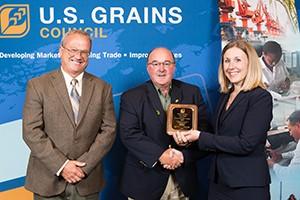Jim Zook always knew he wanted to work in agriculture, but he never imagined his experiences in agronomy, finance, ethanol – even his father’s work as a DeKalb dealer – would lead him to working on international trade and farm policy as the executive director of the Corn Marketing Program of Michigan.
Now, as he passes the five-year milestone participating in the U.S. Grains Council (USGC), he knows he has made great progress in convincing Michigan farmers to focus on the increasing value of exports to their bottom lines.
“It is now part of our major talking points as to why our corn marketing program needs every farmer’s support so we can do more to promote our export markets,” Zook said. “What better than to provide value-added here in the United States and send that finished product overseas. To me, that is the ultimate in how to keep rural America thriving.”
Zook explained Michigan is able to grow a reliable supply of corn most years, thanks to temperatures that are neither too hot in the summer nor bitter cold in the winter, combined with ample access to water for irrigation.
“The temperate climate allows us to be steady producers,” Zook said. “Our volumes are fairly stable year in and year out.”
Thanks to that set of practically-perfect growing conditions, Michigan is the second most diverse state in terms of agricultural products produced, including the largest seed corn producing region in the country. As a result, Michigan farmers are geared towards taking advantage of speciality markets.
“We are used to being able to separate, segment and store our crops,” Zook said. “Because of all those different crops, we have had to pay attention to detail.”
Michigan farmers also benefit from higher truck weight capacities, good access to rail and the potential for future waterway transportation. Yet, despite these advantages, Michigan is not a top export originator for U.S. feed grains and co-products. Instead, Zook said Michigan is able to supply the domestic demand for corn and co-products, allowing other production areas to maximize the value of closer proximity to export market channels.
“We can supply our current domestic needs and help take the pressure off those local markets,” Zook said.
“As we increase our trade, Michigan can continue to produce and fill in those markets so that more grain from those areas at a more economic advantage can fill those international markets.”
With an increase in exports comes increased demand for Michigan agricultural products – an argument Zook has used successfully to get Michigan corn farmers engaged in trade issues.
“I see the growth of our corn industry is in the export markets,” he said. “That is the main reason I stay involved and work to keep Michigan involved. We need to prioritize our budget towards the export market.”


